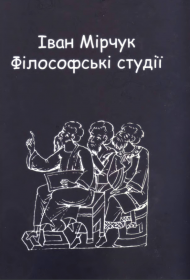Philosophical studies: Munich, Printing and publishing house «Steinmeier», 2006, 582 с.
Keywords:
Ukrainian philosophy, Skovoroda, Czech philosophy, KantSynopsis
The collection presents 14 texts by Ivan Mirchuk that were written between 1923 and 1946. The texts cover a wide range of topics: from ethics and the theory of knowledge to the history of philosophy and mathematics. The texts represent, in particular, Mirchuk's original philosophical conceptions. For example, the article "Are Synthetic Judgements а рriori Possible? On the Critique of a Problem in Kant's Theoretical Philosophy" contains the author's mathematical arguments for the non-existence of such judgements.
CONTENTS
Preface
Ethics and politics
1. Why this topic?
2. The tasks of the state and the tasks of morality
3. The relation of ethics to politics
4. The views of Machiavelli
5. Followers of Machiavelli
6. Misunderstanding of the essence of morality and politics
7. Politics is subordinate to morality
8. The difference between culture and civilization
9. Politics is based on power
10. Conclusion
Fundamentals of Greek ethics
1. Introduction
2. Scientific ethics
3. The concept of ethics
4. Sophistry
5. Cynicism
6. Cyrenaics
7. Plato
8. What is virtue?
9. Stages of development of Plato's ethics
10. The ethics of Aristotle
11. Synthesis.
Metageometry and its importance for Kant's theory of space: A critical and historical study
Hryhorii Savych Skovoroda: Notes on the History of Ukrainian Culture
Philosophical foundations of Masaryk's worldview
General aesthetics
1. Methodological justification of aesthetics
a. What is aesthetics?
b. Is aesthetics possible as a science?
c. The empirical nature of aesthetics
d. Normative character of aesthetics
2. The aesthetic object
a. General features of the aesthetic object
b. Characteristic features of an aesthetic object
3. Aesthetic experience
a. General remarks
b. Theory of "feeling"
4. Aesthetic categories
a. Divisions into aesthetic categories
b. Beauty
c. Disgust
d. Greatness
e. Tragicism
f. Comicism
Petro Lodii and his translation of Baumeister's Elementa Philosophiae
The philosopher Masaryk
Christian Wolff and his school in Ukraine
Are synthetic a priori judgments possible? To the criticism of one problem of Kant's theoretical philosophy
The worldview of the Ukrainian people
1. Introductory notes
2. The main elements of the Ukrainian national worldview
a. The peasant component
b. Ukrainian and foreigner
c. Idealism
d. Individualism
e. Russian community
f. Sensual element
g. Philosophy of the heart
h. The will
i. Religiosity
3. Conclusion
The essence and meaning of philosophy
1. Introduction
2. Name and concepts in its history
3. Relation of philosophy to other sciences and its importance for them
4. The relation of philosophy to religion
5. Division and main problems in philosophy
6. Conclusions: On trends in philosophy before the World War ІІ
Theory of knowledge or gnoseology
1. Instead of an introduction
a. Philosophy and its problems
b. Theory of knowledge in general
2. The essence of gaining knowledge
3. Two problems
a. The problem of the importance or truthfulness of our knowledge
b. The problem of the object of our knowledge
4. Naive and critical realism
a. Naive realism from the point of view of the practical life
b. Critical realism
5. Subjective idealism
6. Phenomenalism
a. Kant's theory of knowledge in the phenomenological sense
b. Criticism of phenomenalism
7. Objective or transcendental logical idealism
a. Kant's theory of knowledge in the transcendental logical sense
b. Evaluation of the transcendental logical idealism
8. The problem of the source or origin of knowledge
a. Rationalism
b. Empiricism
c. Kant's formal rationalism or critical philosophy
9. Critical evaluation of Kant's theory of knowledge
10. The possibility of metaphysics
Appendix
Mykola Shafoval, Ivan Mirchuk as a philosopher
Name index
Downloads




